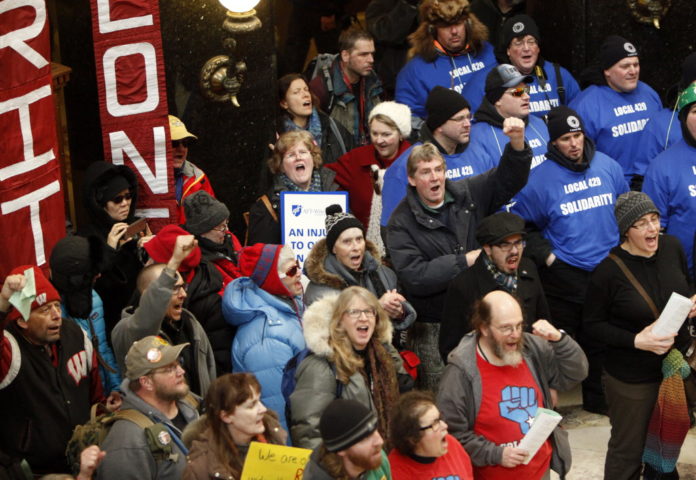While union membership rates in Wisconsin continue to slip, labor advocates point to a surge in new union petitions this year as evidence that workers want a change.
“We are seeing an increase in workers deciding to come together and form a union,” Stephanie Bloomingdale, president of the Wisconsin State AFL-CIO, said in a recent interview. “We’re seeing workers coming together in many different sectors to say that they want to have a greater voice in the workforce.”
The percentage of Wisconsin workers in unions has been declining for decades. It dipped slightly below the national rate in 2012 before falling several percentage points below the national rate in 2015. But advocates say long-term trends such as wages not keeping up with inflation and productivity, as well as more recent pandemic-related pressures, are now driving more workers to unionize and go on strike in hopes of improving their situation.
Figures from the National Labor Relations Board show a relatively high number of union petitions have been filed in the state so far this year, driven in part by a number of Starbucks locations seeking to unionize.
Eleven new union petitions have been filed with the NLRB over the first four months of 2022, according to the board’s website. Seven of those came from workers at Starbucks coffee shops in Fitchburg, Madison, Monona, Appleton, Plover and Oak Creek. Wisconsin AFL-CIO announced last week that workers in Oak Creek and Plover “made the history books” by becoming the first two unionized Starbucks locations in the state.
Other new petitions this year came from PTG Live Events in Milwaukee, Ahern Rentals in Franksville, Activision Blizzard’s Raven Software in Middleton and Carmen Schools of Science and Technology in Milwaukee.
By comparison, 10 new union petitions were filed in Wisconsin over the entirety of 2021, the NLRB site shows. That number was 18 in 2020, 17 in 2019, 14 in 2018 and 12 in 2017.
One of the petitions in 2020 came from workers at the Seven Mile Creek Landfill in Eau Claire, where workers recently went on strike in hopes of getting “fair” wages and better benefits. That’s according to International Union of Operating Engineers Local 139 Organizing Director Michael Ervin, who told WisBusiness.com an unfair labor practice charge against owner GFL Environmental/Everglades Holdings LLC is being investigated by the Minneapolis office of the NLRB.
“The bottom line is we’re just fighting for the workers,” he said in an interview. “You see that going on around the country with Amazon and Starbucks, and hopefully this is something that’s going to continue to grow.”
A Starbucks spokesperson said in a statement that “we are listening and learning from the partners” in the Wisconsin stores seeking to unionize “as we always do across the country.”
“From the beginning, we’ve been clear in our belief that we are better together as partners, without a union between us, and that conviction has not changed,” the spokesperson said. “We respect our partner’s right to organize and are committed to following the NLRB process.”
Meanwhile, the state’s union membership rate fell from 8.7 percent in 2020 to 7.9 percent in 2021, according to the latest data from the U.S. Bureau of Labor Statistics. That rate has hovered around 8 percent since falling below the national rate in 2015, which was about 11.1 percent at the time. That’s since fallen slightly to 10.3 percent in 2021, the latest BLS figures show.
Over the 10-year period covering 2008-2018, Wisconsin saw a decline of about 165,000 union members, according to the 2018 State of the Unions report from the Midwest Economic Policy Institute, the UW-Madison School for Workers and the University of Illinois at Urbana-Champaign. That accounted for about 12.9 percent of the 1.3 million national union member decline over the same period, the report shows.
A more recent report from the Wisconsin Policy Forum found Wisconsin experienced the largest drop in union membership among U.S. states over the past two decades.
In 2000, 17.8 percent of all employed Wisconsinites were union members, which was the 10th highest concentration in the country. Its decline to 7.9 percent in 2021 brought the state down to 28th highest, marking the largest decline in the nation by nearly 3 percentage points, the report shows.
The WPF report also notes 2011 Wisconsin Act 10 — which limited collective bargaining rights for public sector employees — “likely contributed to a much steeper decline” in public sector union membership in the second half of that period. It shows public sector union membership dropped sharply following Act 10.
The state passed its “right-to-work” law in 2015, which prohibited private sector employers from forming labor contracts that require employees in a collective bargaining unit to be union members to be employed, among other changes. The state’s private and overall union membership rates did not change significantly following the law’s passage, the WPF report shows.
Public sector union membership in the state dropped from 50.3 percent in 2011 to 22.1 percent in 2020, according to the WPF report. Over the same period, private sector union membership in Wisconsin saw a much smaller decline, from 7 percent to 6.5 percent.
But even as union membership shrinks in Wisconsin, Bloomingdale says the impact of the COVID-19 pandemic on frontline workers in particular is pushing more to seek union representation and better working conditions.
“We always knew that it’s the workers that make the profits for these companies in America, but during the pandemic, working people stepped up and went to work,” she said. “They couldn’t Zoom it in, they couldn’t work from home. They kept our economy moving … it’s time for our workers to be rewarded in terms of good pay and working conditions.”
She added more workers are willing to go on strike as existing union contracts are negotiated “to get what they need for themselves and future generations of workers.”
Wisconsin Manufacturers and Commerce spokesman Nick Novak argues the higher number of union petitions represent “a very small part” of the state’s economy. In an interview, he noted wages have been rising and employers are offering more flexibility and benefits even as union membership has been declining in the state.
“I think that’s because employers care about their employees and they want to do right by them,” he said. “And they’re listening to their workers, they’re listening to what their wants and needs are, and they’re really trying to be as flexible as they can to make sure that not only can they still run a successful, profitable business, but really take care of their number one resource, which is their workers.”
In a recent high-profile example of workers striking, more than 1,000 CNH Industrial workers went on strike earlier this month at plants in Racine and Burlington, Iowa, following a breakdown in contract negotiations. Workers at the plant are represented by United Auto Workers and are reportedly seeking higher pay and better benefits.
And late last week, over 100 members of the International Association of Sheet Metal, Air, Rail and Transportation Workers Local 565 chapter went on strike at Trachte Building Systems in Sun Prairie. Jesse Buell, the chapter’s business manager, said the workers are protesting efforts by their employer to enforce “unlimited mandatory overtime,” and accused the company of trying to break up the union.
After the workers rejected the company’s “last, best and final offer” on a contract, Buell said the company denied a request on a negotiation extension and “told us we could take the strike vote.” He said that vote was almost unanimous, but added he’s worried the company will outlast the workers currently going without pay.
“We have a very strong bargaining unit out there, but in the end we’re all trying to survive, right?” Buell said. “If the company’s prepared enough to bleed out the membership, people are going to be put to some hard decisions.”
In an emailed statement, Trachte Building Systems says it has “bargained in good faith attempting to reach a collective bargaining agreement” with the union.
“We are a 100% employee-owned company and our teammates have the opportunity for significant wealth building in the long-term,” the company said. “The work stoppage is affecting all of us, but we are continuing to operate to serve our customers and community on an uninterrupted basis through the efforts of our employee owners who have chosen not to join the strike.”
GFL Environmental/Everglades Holdings LLC did not respond to requests for comment.
–By Alex Moe






